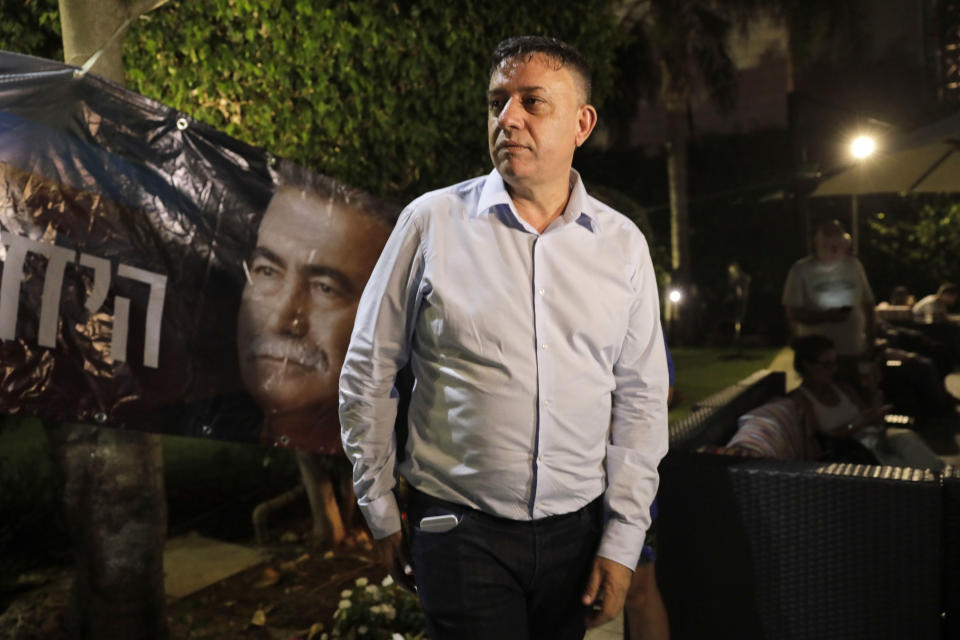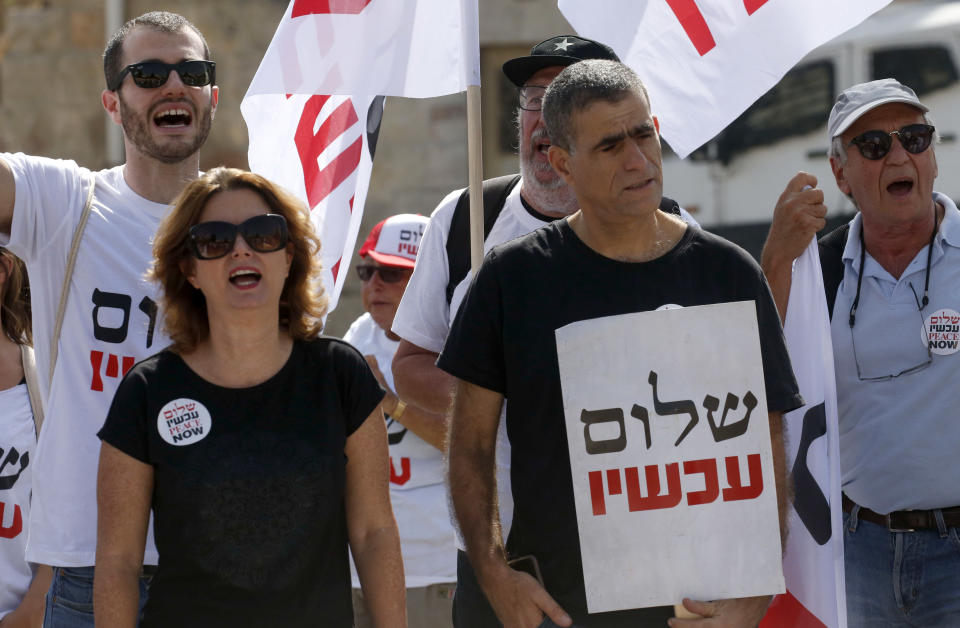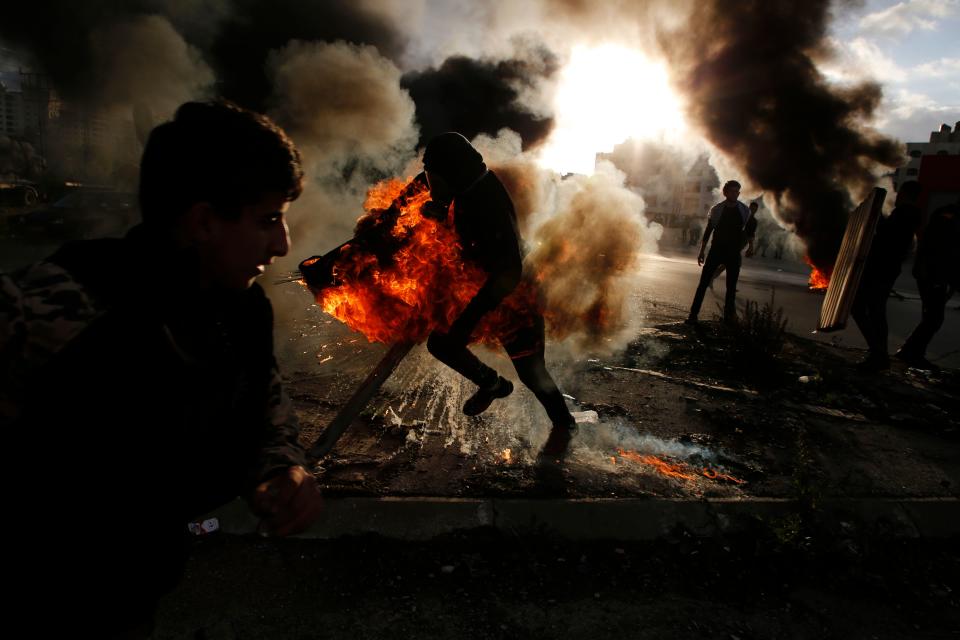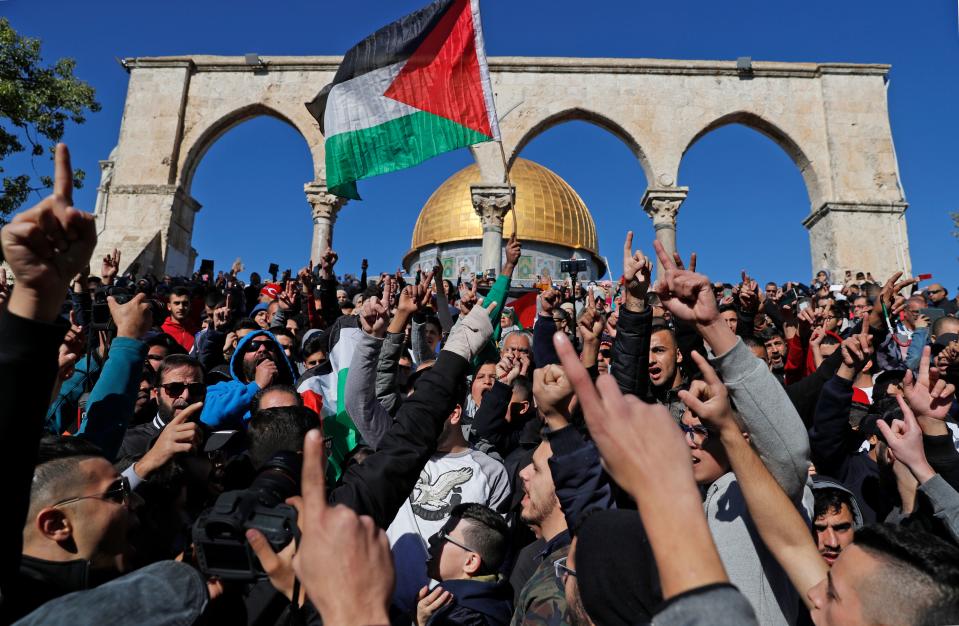In Israel, even the left backs Trump on Jerusalem
TEL AVIV — If nothing else, President Trump’s recognition this week that Jerusalem is what the Israelis say it is — the capital of their country — managed the impressive feat of bringing together Israel’s famously contentious political parties, which with (almost) one breath, responded: at last. But at the same time, it highlighted differences with mainstream American Jewish groups — and, predictably, set off protests by Palestinian Arabs and drew a warning about a “third intifada.”
The reaction to Trump’s speech, which also marked the start of what will be a years-long process of moving the American embassy from its present home in Tel Aviv, demonstrated that Jerusalem — where King Solomon had his temple — is a topic that cuts across political lines in Israel. And even as divisions have persisted about questions such as the future of Jewish settlements on the West Bank, parties across almost the entire spectrum have coalesced behind the view that Israel should retain sovereignty over the entire city.
In anticipation of Trump’s announcement on Wednesday, Yair Lapid, head of the centrist party Yesh Atid (There Is a Future), said: “This is also the time for the entire world to recognize united Jerusalem as the capital of Israel.” Even Avi Gabbay, the newly elected leader of the Israeli Labor party, stated that he believed Israel should retain control over the entirety of Jerusalem: “Jerusalem should be united under our sovereignty.” Yet he also expressed hope that the American president’s decision would breathe new life into a moribund peace process: “I hope that along with the recognition, the American administration will take steps in the Middle East to restart the peace process. It can happen. We should see it as something that can inspire negotiations.”

And, of course, the Israeli right was quick to applaud Trump. In a video released on social media after the president’s speech, Prime Minister Benjamin Netanyahu compared the announcement to monumental events in Israeli history, such as the Balfour Declaration, a 1917 white paper by the British government often considered the foundational document of the modern State of Israel.
And the far-right religious-nationalist Jewish Home party has responded to Trump by pushing an amendment to the 1980 constitutional law that codified Jerusalem as the capital of Israel. The Jewish Home Party amendment would require any concessions of parts of Jerusalem to be approved by a two-thirds majority in Israel’s parliament. Naftali Bennett, chairman of the Jewish Home party and the current minster of education, said: “For 25 years, talks of peace failed because they were always based on the illusion of carving up Jerusalem. This week, President Trump took a bold step toward peace, making it clear Jerusalem is Israel’s capital.” The bill, he said, “will guarantee no changes are made in our united and eternal capital without broad consensus and support.” The final vote for the bill is scheduled for Monday, just five days after Trump’s announcement.
All of this marks a distinct shift in Israeli opinion in recent years. Since the peace process began in the mid-1990s, it has been the consensus view that Jerusalem would become the divided capital of both Israel and a future Palestinian state as the outcome of a final status negotiation between the two parties. In Trump’s speech at the White House on Wednesday, he was careful to refer to Israel as the capital of Israel, not the “undivided capital” of Israel — a phrase which could be seen as putting a finger on the scale of the outcome of Jerusalem’s status in any future American-led negotiations between Israelis and Palestinians.
In the past, Israeli prime ministers from different parties have said they were willing to relinquish control of Arab neighborhoods in East Jerusalem to their Palestinian counterparts. In 2000, Ehud Barak, the former prime minister from the Israel’s center-left Labor Party, offered to the Palestinians neighborhoods in East Jerusalem and the site that Jews call the Temple Mount and Muslims call the Noble Sanctuary — the holiest site in Judaism and the third most holy site in Islam. And in 2008, Ehud Olmert, from the centrist party Kadima (Forward), similarly offered to withdraw from East Jerusalem neighborhoods and the Old City of Jerusalem, where the most important holy sites are located.

But Israeli consensus has shifted noticeably to the right in recent years, including on Jerusalem. And as Israeli politics drift further to the right, and the predominantly liberal American Jewish community responds to Donald Trump, differences between the American and the Israeli Jewish communities appear to be growing.
Labor Party leader Gabbay, a successful businessman who is a relative newcomer to politics, switched his party affiliation from the center-right Kulanu party to Labor before taking control of the party in July. Since then, he has moved the party to the right, although not without controversy. In October, Gabbay broke with the Labor Party’s long-standing tradition of opposing Israeli settlements in the West Bank when he suggested that a peace deal with the Palestinians wouldn’t necessarily require Israel to evacuate settlers from territories it would turn over: “If a peace deal is made, why do we need to evacuate? I think the dynamic or the terminology that we have become accustomed to, that if you make a peace deal you evacuate, is not actually true.” Gabbay supports a two state-solution, which is the solution to the Israeli-Palestinian conflict that the U.S. and most of the international community prefer.
The only leaders of Israeli parties to criticize Trump’s declaration on Wednesday were the leaders of Meretz and the United Arab List. But both parties are outliers in Israeli politics. Earlier this year, Meretz broke with the rest of Israel’s Jewish political parties when it removed the word “Zionism” from its platform, spurring a debate about whether it was still a Zionist party. One member, Mossi Raz, tweeted, “Meretz never defined itself as a Zionist party. I am a Zionist, most of the Jews in Meretz are Zionists, but a party which includes Arabs by definition cannot be a Zionist party.” In anticipation of Trump’s announcement, Zehava Gal-On, the leader of Meretz, warned that: “Moving the embassy could serve Netanyahu but could bring about an unnecessary explosion.” And the United Arab List is a coalition of parties primarily representing Arab Israelis that formed before the 2015 Israeli elections. Historically, Arab political parties have not been invited to join in government coalitions. Ayman Odeh, chairman of the United Arab List, said: “If the Israeli government wants the world to recognize West Jerusalem as the capital of Israel, all it has to do is recognize East Jerusalem as the capital of Palestine.”

While there was widespread approval of Trump’s decision among Jewish Israelis, things looked very different in the American Jewish community. Many prominent American Jewish organizations expressed concerns about the plans to move the embassy. Rick Jacobs, president of the Union of Reform Judaism, the largest branch of Judaism in America, cautioned against moving the American Embassy from Tel Aviv to Jerusalem: “While we share the President’s belief that the U.S. Embassy should, at the right time, be moved from Tel Aviv to Jerusalem, we cannot support his decision to begin preparing that move now, absent a comprehensive plan for a peace process.” And other Jewish organizations, such as the liberal advocacy group J Street, as well as organizations such as the Association of Reform Zionists of America, the Central Conference of American Rabbis and the Women’s Rabbinic Network, also came out against the move.
Meanwhile, Israel is bracing itself for massive protests as the Palestinian leadership called for three days of rage. On Thursday, most protests were held in Palestinian-majority towns in the West Bank, including Hebron, Nablus, Jenin and Ramallah. Protesters sparred with Israeli soldiers, and more than 95 Palestinians have been injured. But the Israeli defense establishment expects violence to erupt in East Jerusalem on Friday afternoon following afternoon prayers. It is preparing for such an event, which will include rallies at Damascus Gate, the commercial center of East Jerusalem.
Looking ahead, nobody knows precisely what to expect, or how long the violent protests will last. The leader of Hamas, Ismail Haniya, described Trump’s announcement of a “war declaration against the Palestinians,” and called for a new intifada, evoking the first and second intifadas, years-long periods of conflict between Israeli Jews and Palestinians in which thousands on died on both sides. Many have noted that controversies related to Jerusalem have inspired violent protests in the past: The second intifada began after Ariel Sharon, then head of the opposition, made a controversial visit to the Temple Mount in Jerusalem. And last summer, there was a brief but deadly crisis when, after a terrorist attack killed two people, Prime Minister Benjamin Netanyahu installed metal detectors outside Al-Aqsa mosque, the house of worship located in the Noble Sanctuary and an important symbol of Palestinian nationalism. After massive Palestinian protests in East Jerusalem in which several Palestinians died, the crisis ended when the metal detectors were removed.

Ben Manson is a freelance journalist based in Tel Aviv.
(Cover tile photo: Yahoo News photo illustration; photos: AP, Oded Balilty/AP)
Read more from Yahoo News:
Trump’s top aides, including one he fired, praise his loyalty
‘Pizzagate’ troll claims another victim as culture war rages on
Japanese defense in the age of North Korean missile successes
Divided by symbols, Americans see a ‘serious threat’ across the aisle
Photos: Wildfires in Southern California force thousands to flee


